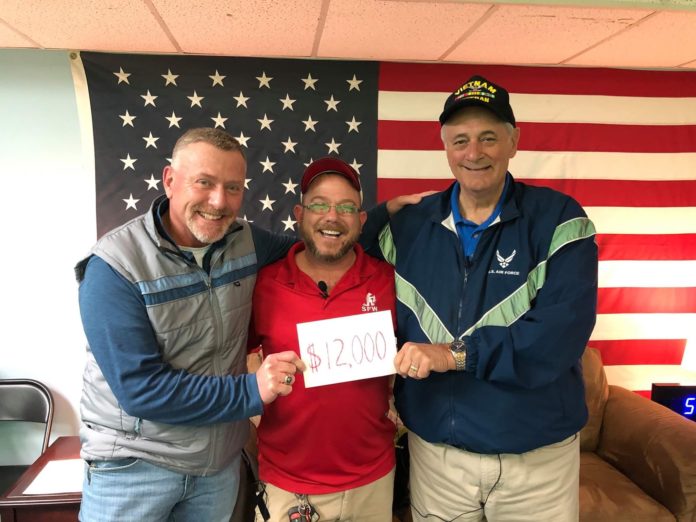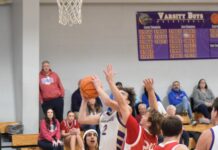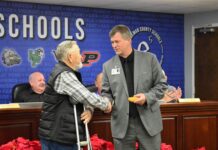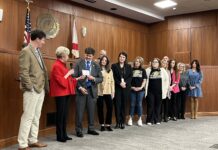
CORRECTION- 3-11-20 at 6:55 p.m.
In The Tribune’s coverage of the stellate ganglion block (SGB) shot, we have said, “The SGB shot is FDA-approved.” In fact, the medications administered through the shot are FDA-approved. The shot itself does not require FDA approval.
“You know, $800 can change, and may even save, a veteran’s life.” Col. Ken Brown
CULLMAN, Ala. – According to local Vietnam veteran and veterans advocate, retired Col. Ken Brown, each day 22 veterans commit suicide in the United States. A new treatment for post-traumatic stress disorder (PTSD) aims to reverse that trend, and local nonprofit Saving Forgotten Warriors (SFW) officially launched the local effort, the “800 Club,” Thursday night, with a $12,000 donation from Apel Steel.
The shot
“It’s far too many; we’ve got to do something. A lot of these veterans have PTSD,” said Brown. “There’s a new procedure that’s been perfected to deal with it. It is a shot in the neck that relaxes the nerves, the stellate ganglion nerves, that, in layman’s terms, ‘reboots’ the nervous system. There’s been a three-year study on it, and it’s been 90% effective. The shots last five years or more, and the results are almost instantaneous. PTSD is a debilitating disease, not only to the veterans who have it, but also to their families who go through it. A lot of veterans can’t handle PTSD and commit suicide.”
Brown said the shot, called the stellate ganglion block (SGB), is now being given at military hospitals, but the procedure has not yet been made available to VA hospitals around the country.
“The stellate ganglion is like a routing center for the nervous system and controls the impulse for ‘fight or flight’,” said a statement from Kristine Rae Olmsted, a research epidemiologist with RTI International, an independent nonprofit research institute. “Anesthetizing the ganglion blocks nerve impulses temporarily. We still don’t know how SGB works to improve PTSD symptoms, but now we know that it does.”
According to RTI International: “In the early 2010s, some military medical centers began offering patients with PTSD a procedure that had been used for decades to relieve pain. The procedure, called stellate ganglion block, or SGB, involves injecting a local anesthetic into the stellate ganglion. This group of nerve cells and nerves in the neck helps regulate the body’s ‘fight or flight’ mechanism. As more and more patients tried the stellate ganglion block, the reports seemed promising. But the medical community still needed evidence of its effectiveness. RTI in 2014 launched a randomized, controlled trial of SGB, and in fall 2019, we found that it is indeed effective.”
You can read the study here: https://jamanetwork.com/journals/jamapsychiatry/article-abstract/2753810.
The 800 Club
“There’s a former Navy SEAL doctor in Annapolis, who is offering these shots now for $800. They normally cost between $1,500 and $3,000 a shot elsewhere,” said Brown. “He is the closest one we’ve found to Cullman. We have 7,000 veterans in Cullman County, and a bunch of them have PTSD. So the objective is to get the word out and have them get in touch with Jeremy Hogan at Saving Forgotten Warriors, and he will line them up to go get the shot in Maryland.”
SFW is aiming to fly 24 veterans suffering from PTSD per year, eight per trip, to Maryland to receive the shot.
“We’re going to take the first group of eight in February, and we’ve established what we call the ‘800 Club,’ named for the $800 it will cost per shot, and we’re trying now to raise the financing in the community to support taking these guys up there,” said Brown.
The group is reaching out to the Cullman community for help.
“We’re asking individuals, churches and businesses in the community if they would donate $800 to Saving Forgotten Warriors to help a veteran get a shot, and then we’ll work on the funding to get them up there and back,” said Brown.
“We’re working with Delta Airlines to try to get the flight costs down to almost nothing,” he said. “I have some veteran friends in Annapolis, my hometown, who are working to see if they can’t get lodging and transportation lined up.”
It’s going to cost $1,500 per person for the first group, including the shot, transportation, meals and lodging, according to Brown.
That’s where local businessman and philanthropist Ronny Apel, of Apel Steel, stepped in.
“Eight times $1,500 is $12,000,” said Brown, “and Ronny Apel of Apel Steel gave Jeremy (Hogan) a check for $12,000 last night (Thursday) to kick the program off.”
He said of Apel, “Somebody in the community anteing up $12,000 is a big deal. That starts the 800 Club. He is a good man.”
The group is now working on the spring trip, which Brown said will probably take place in May.
Local success
One Cullman County veteran, Bo Winfrey, has already gone independently to receive the shot.
“He is an Iraqi Freedom veteran, who has been battling PTSD for 15 years,” said Brown. “He was close to ending his own life. His wife found out about this, threw him in the car and drove him up to Annapolis. He got the shot and it has absolutely changed his life.” (Look for a full feature story on Bo Winfrey soon.)
“There are a lot of people in this community who could donate $800. This is the season of giving,” said Brown. “This is the time of year if you need a tax break, you can make a charitable donation. I can’t think of a better donation to make than to this cause. I’m hopeful that people will come through.”
A word from Jeremy Hogan
“This is going to be the biggest program Saving Forgotten Warriors has ever had,” said Hogan. “This will impact the state’s suicide rate, guaranteed. If we can get the local and state community on board on this…honestly, this is the program the state needs. I’m actually working on a program to get a doctor certified to give the shot here. I’m even offering to put it on the property that Saving Forgotten Warriors has. If we can do it, God willing, if we can raise the money. Every business in this county probably has a veteran. That veteran will benefit, and so will the business.”
Hogan pointed out that the shot is not a cure.
“It’s not a cure,” he said. “It will relieve them of the effects. There are so many different benefits. It puts you back to baseline. There are no negative side effects from this shot. None. It is a shot that numbs the nerves.”
Hogan himself, a veteran of Iraq and Afghanistan who has suffered from severe PTSD since 2004, will get the shot in February, before the first group. He will pay for his shot out of his own pocket.
“Some nights I’ll go to bed and beg my wife not to let me go to sleep,” he said. “The dreams are horrible. The thoughts and the memories. I deal with this every single night. I don’t get rest. I sleep maybe two to three hours a night.
“The main thing that’s giving me excitement about the shot is that I get to see my kids in a different light, and I get to feel that my kids are not scared of me. Don’t get me wrong. I’ve never hurt my kids. I’m a Marine. I’ve literally listened to my wife tell the kids to give daddy a break today because he’s not feeling good. Multiple times. That hurts. It hurts. When I put my family through this when they never even asked for it. When I met my wife, she’d never been around a military person, and when I started having my problems, she was blown away. She didn’t ask for that. I’ve asked her many times to walk away. I’ve been suicidal. A year-and-a-half before I started Saving Forgotten Warriors, I was trying to end my life.”
Hogan credits family and SFW for saving his life.
“Really, Julie (Hogan’s wife), my grandfather and Saving Forgotten Warriors saved my life,” he said, “but in the four-and-a-half years since I started Saving Forgotten Warriors, I’ve been suicidal. I was in a really dark place. I was on a roller coaster of emotion that I couldn’t control. I went to bed last night with the thought, that after the shot, it’s going to be like an out-of-body experience. I don’t recall, I really don’t remember, what I was like before 2004.”
Hogan was an infantryman in both Iraq and Afghanistan.
“If I don’t have to go another 20 years waking up like I do every day now, then I’ll be good to go. I mean, like I tell everybody, if I had to go once a year to get this shot, it would be much better than the alternative, so my family could have their husband and father the way he’s supposed to be,” he said. “I never in a million years would have thought of the psychological impact that going to combat was going to have on me. I was expecting it to be rough, don’t get me wrong. I was expecting there to be a recovery time, but I was never expecting it to be… I’ve been out of the Corps for 10 years, and every morning I wake up with the same thoughts. I’ve been through multiple therapies and been on every drug they’ve got. It’s been one hell of a roller coaster I’m ready to get off of. And to be able to be part of something where we’re offering this to men and women who have gone through it and still suffer the way I do, makes me joyous. I’m so blessed to see this. It is absolutely amazing to be a part of. I’m beyond blown away that God even allowed me to be a part of this. I don’t deserve it.”
How to donate or get help
SFW is a 501(c)(3) nonprofit, and any donation is tax-deductible. Donations can be mailed to P.O. Box 1002, Cullman, AL 35056. If you, or someone you know, is a veteran in need, contact SFW at 256-747-5006.
Copyright 2019 Humble Roots, LLC. All Rights Reserved.


























